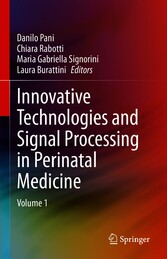Suche
Lesesoftware
Info / Kontakt

Innovative Technologies and Signal Processing in Perinatal Medicine - Volume 1
von: Danilo Pani, Chiara Rabotti, Maria Gabriella Signorini, Laura Burattini
Springer-Verlag, 2020
ISBN: 9783030544034 , 232 Seiten
Format: PDF
Kopierschutz: Wasserzeichen


Preis: 90,94 EUR
eBook anfordern 




